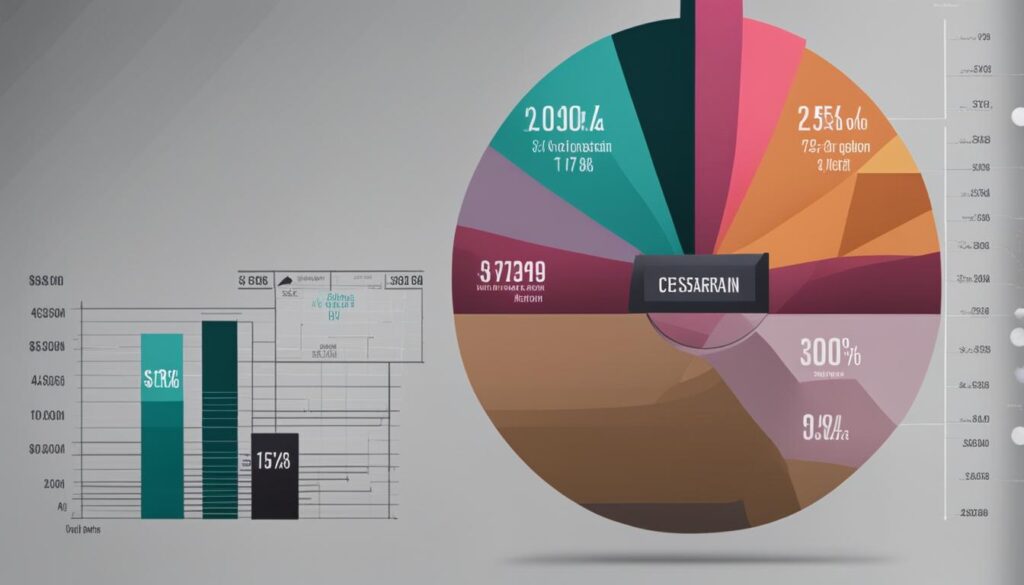How Much Does It Cost to Give Birth?
Giving birth in the United States can be a costly experience, with expenses including hospital fees, prenatal care, and postpartum care. According to the Peterson-Kaiser Family Foundation (KFF) Health System Tracker, the average cost of childbirth in the US is $18,865. This amount includes pregnancy, delivery, and postpartum care. However, it’s important to note that the actual cost can vary depending on factors such as the type of birth and location. Health insurance can help cover a significant portion of these costs, but for those without insurance, the hospital bill can be substantial.

Key Takeaways
- The average cost of giving birth in the US is $18,865, including pregnancy, delivery, and postpartum care.
- Actual costs can vary based on factors such as the type of birth and location.
- Health insurance coverage can help offset a significant portion of childbirth expenses.
- For those without insurance, the hospital bill for childbirth can be substantial.
- It’s important to consider the cost of prenatal care, as it contributes to the overall expenses associated with giving birth.
Average Cost of Childbirth in the US
When it comes to the average cost of giving birth in the United States, including pregnancy, delivery, and postpartum care, expect to pay around $18,865, according to data from the Peterson-Kaiser Family Foundation (KFF) Health System Tracker.
This figure represents the overall cost for individuals with health insurance. However, it’s important to note that the actual expenses can vary based on factors such as the type of birth (vaginal delivery or cesarean) and individual circumstances.
While health insurance coverage can help offset a significant portion of these childbirth costs, it’s essential to be aware that out-of-pocket expenses may still apply for plan members. Understanding the average cost of childbirth and the potential financial implications is crucial for expectant parents.
To gain a better understanding of the costs associated with childbirth, let’s take a closer look at the breakdown of expenses.
Breakdown of Average Childbirth Costs:
| Expense Category | Average Cost |
|---|---|
| Hospital Fees | $6,635 |
| Prenatal Care | $3,035 |
| Delivery | $4,876 |
| Postpartum Care | $3,319 |
| Additional Expenses* | $1,000 |
*Additional expenses may include medications, tests, and other unforeseen costs.
As seen in the table above, the cost of hospital fees for childbirth accounts for a substantial portion of the average childbirth costs. Prenatal care, delivery, and postpartum care expenses also contribute significantly to the overall cost.
It’s worth noting that these figures represent averages and can vary depending on factors such as geographical location, specific healthcare providers, and individual medical needs.
Factors Affecting the Cost of Giving Birth
Several factors can contribute to the overall cost of giving birth. These include:
- The location of the birth
- The level of prenatal care required
- The type of birth (vaginal or cesarean)
- The mother’s hospital charges
- The cost of medications administered during delivery
- The baby’s hospital charges for initial medical care
- The need for any additional newborn care
The cost of prenatal care, including regular visits to the obstetrician’s office and necessary tests and screenings, can also add to the expenses.

Average Out-of-Pocket Costs for Childbirth with Health Insurance
For individuals with health insurance coverage, the average out-of-pocket cost for childbirth is $2,854, according to the Peterson-Kaiser Family Foundation (KFF) Health System Tracker.
This includes expenses such as deductibles, copayments, and coinsurance. The specific amount can vary depending on the individual’s health insurance plan and the level of coverage.
It’s essential to review the plan details, including deductibles, copayments, and out-of-pocket maximums, to understand how much you might expect to pay for childbirth.

Having health insurance can significantly help offset the overall expenses of giving birth. However, it’s important to be aware of the potential out-of-pocket costs that you may still need to cover.
It’s advisable to contact your health insurance provider to gain a clear understanding of the specific costs and coverage associated with childbirth.
Average Cost of Vaginal Delivery and Cesarean Birth
When it comes to the cost of giving birth, the type of birth you have can significantly impact the overall expenses. On average, a vaginal delivery costs $14,768, while a cesarean birth has an average cost of $26,280. These figures account for the comprehensive expenses associated with each type of birth, including prenatal care, delivery, and postpartum care.
For those with health insurance coverage, the average out-of-pocket cost for a vaginal delivery is $2,655, whereas a cesarean birth may lead to an average out-of-pocket expense of $3,214. It’s essential to keep in mind that these costs can vary based on individual circumstances, such as the specific health insurance plan you have and the deductible, copayments, and coinsurance associated with it.
Understanding the average costs of vaginal delivery and cesarean birth can help you plan your finances and make informed decisions regarding your healthcare expenses during pregnancy and childbirth.
Comparison of Average Costs
| Type of Birth | Average Cost | Average Out-of-Pocket Cost (for health insurance plan members) |
|---|---|---|
| Vaginal Delivery | $14,768 | $2,655 |
| Cesarean Birth | $26,280 | $3,214 |
As seen in the table, the costs for cesarean birth are significantly higher compared to vaginal delivery. However, it’s important to note that the health and well-being of both the mother and baby are the primary factors to consider when determining the most suitable method of delivery. Medical professionals will assess each individual case to ensure the safety and well-being of both mother and child.

Variation in Childbirth Costs by State
The cost of giving birth can vary significantly from state to state, even for individuals with health insurance coverage. Understanding the average out-of-pocket costs for childbirth in different states is essential when estimating potential expenses.
According to the Health Care Cost Institute, the highest average out-of-pocket costs for childbirth with health insurance are found in Nebraska, while the lowest average costs are in Michigan.
Table: Average Out-of-Pocket Costs for Childbirth by State
| State | Average Out-of-Pocket Costs |
|---|---|
| Nebraska | $X,XXX |
| Michigan | $X,XXX |
| [State 1] | $X,XXX |
| [State 2] | $X,XXX |
| [State 3] | $X,XXX |
“The cost of giving birth can vary significantly from state to state, even for individuals with health insurance coverage.”
The specific average costs for childbirth, including both vaginal delivery and cesarean birth, can vary considerably depending on the state. It is crucial to consider these variations when planning for the financial aspects of giving birth in a particular location.

Importance of Prenatal Care in Costs
Prenatal care is a vital aspect of ensuring a healthy pregnancy and can also impact the overall cost of giving birth. Regular prenatal visits, which typically range from 10 to 15 visits for a normal pregnancy, involve various tests, screenings, and routine blood work that help monitor the well-being of both the mother and the baby. These visits allow healthcare providers to identify and address any potential complications or risk factors early on, helping to mitigate any potential risks and ensure a smooth pregnancy journey.
During prenatal visits, healthcare professionals may conduct a range of tests and screenings to assess the health of the mother and the developing baby. These tests can include blood tests to check for certain conditions, ultrasounds to monitor fetal growth and development, as well as screenings for genetic disorders or chromosomal abnormalities. By detecting any potential issues during these tests, healthcare providers can take appropriate measures to manage or treat them, ultimately reducing the risk of complications during childbirth.
The cost of prenatal care, including the regular visits to the obstetrician’s office and the necessary tests and screenings, should be factored into the overall expenses associated with pregnancy and childbirth. It’s important to consider these costs when planning for the financial aspects of having a baby. While the exact cost of prenatal care can vary depending on factors such as the healthcare provider, location, and specific tests or procedures required, understanding the general range of costs can help individuals and couples prepare for the financial responsibility of bringing a child into the world.
Providing comprehensive prenatal care is essential for ensuring a healthy pregnancy and reducing the risk of complications during childbirth. Regular check-ups and early detection of any potential issues can help healthcare providers intervene promptly and provide the necessary treatment or interventions, thus minimizing additional healthcare costs in the long run. Prenatal care is an investment in both the health of the mother and baby and plays a significant role in the overall cost of giving birth.

| Cost Component | Average Cost |
|---|---|
| Initial prenatal visit | $120 – $200 |
| Subsequent prenatal visits (per visit) | $90 – $150 |
| Tests and screenings | $100 – $1,000+ |
| Ultrasounds | $200 – $500+ |
| Genetic testing | $300 – $2,500+ |
| Medications | $50 – $500+ |
Options for Managing Medical Bills After Childbirth
If you find yourself unable to pay your medical bills after childbirth, there are several options available to help ease the financial burden.
The first option is to inquire with the hospital about setting up a payment plan. Many hospitals offer payment plans that allow you to break down the total cost of childbirth into manageable monthly installments. This can make it more feasible to pay off your medical bills over time, rather than facing a hefty lump sum payment.
Another option is to explore discounted rates for medical bills. Hospitals often provide discounts for patients who do not have health insurance or who meet certain criteria. These discounts can significantly reduce the overall cost of your medical bills, making it more affordable for you to manage your expenses.
If you are uninsured or have limited financial resources, you may be eligible for government health insurance programs such as Medicaid or the Children’s Health Insurance Program (CHIP). These programs provide coverage for qualifying individuals and can help alleviate the financial burden of medical bills after childbirth. To determine your eligibility, you can visit the Medicaid or CHIP website or contact your local healthcare office for more information.
Exploring these options can provide you with the necessary support to manage and pay your medical bills after childbirth, ensuring that your focus can remain on the well-being of yourself and your newborn.

| Options for Managing Medical Bills After Childbirth |
|---|
| 1. Set up a payment plan with the hospital |
| 2. Inquire about discounted rates for uninsured or qualifying patients |
| 3. Explore government health insurance programs like Medicaid or CHIP |
Getting Health Insurance While Pregnant
Being pregnant should not deter you from securing health insurance coverage. There are options available to ensure you have access to the necessary prenatal, childbirth, and postpartum care.
If you are pregnant and in need of health insurance, you can enroll in a plan through the health insurance marketplace. Regardless of how far along you are in your pregnancy, you can still take advantage of this opportunity. The health insurance marketplace provides a range of plans to suit different needs and budgets.
Another option to consider is Medicaid, which offers coverage during pregnancy for individuals who meet the income requirements. Medicaid can help cover the costs associated with prenatal care, labor and delivery, and postpartum care. It’s important to check if you qualify for Medicaid and apply as soon as possible.
In addition, the Children’s Health Insurance Program (CHIP) may provide coverage for pregnant women in certain states. CHIP is designed to offer healthcare benefits to children from low-income families, and some states extend this coverage to pregnant women as well. Explore whether your state includes pregnant women in their CHIP program to ensure you have the necessary coverage.

By exploring these options, you can secure the health insurance coverage you need during your pregnancy. This will enable you to receive the essential medical care and support throughout the prenatal journey, childbirth process, and postpartum recovery.
Regional Variation in Hospital Birth Costs
When it comes to giving birth in the United States, it’s important to consider the regional variation in hospital birth costs. Depending on the state you reside in, the cost of hospital births can vary significantly. It’s essential to understand these regional differences to estimate the potential expenses associated with giving birth in a specific location.
For example, New Jersey has the highest average price for hospital births, with an average cost of $29,048. On the other hand, Nebraska has the lowest average price, with an average cost of $8,805. These variations highlight the disparity in hospital birth costs across different states, emphasizing the need for careful consideration when planning for the financial aspect of childbirth.
| State | Average Cost of Hospital Birth |
|---|---|
| New Jersey | $29,048 |
| Nebraska | $8,805 |
As you can see, the difference in average costs between states is substantial. These cost variations can be influenced by factors such as local healthcare policies, the cost of living, availability of healthcare services, and overall regional healthcare market dynamics. Understanding the regional cost differences can help you plan and budget for the expenses associated with giving birth, ensuring you are financially prepared for this significant life event.

By taking into account the regional variation in hospital birth costs, you can make informed decisions and mitigate any potential financial surprises. Whether you are considering giving birth in New Jersey, Nebraska, or any other state, understanding the regional differences will enable you to plan for the financial aspect of childbirth and make necessary arrangements to cover the expenses.
Tips for Saving Money During Pregnancy and Delivery
When it comes to pregnancy and delivery, expenses can quickly add up. However, there are several ways you can save money and reduce childbirth costs. Consider implementing the following tips to help you plan for prenatal care expenses and manage the financial aspect of this significant life event.
Firstly, staying in-network and choosing an in-network hospital or facility can significantly lower your costs. By selecting healthcare providers and facilities that are within your insurance network, you can benefit from negotiated, discounted rates, helping you save money on medical services and procedures.
Secondly, planning ahead by working with your doctor to create a birth plan can help you make informed decisions and potentially minimize unnecessary expenses. By outlining your preferences, such as the type of birth you would like and any special requests, you can avoid costly interventions that may not be medically necessary.
Lastly, shopping around for prenatal vitamins and taking advantage of any available discounts or insurance coverage can make a difference in saving money on essential items. Compare prices at different retailers, check for online promotions, and consider using store loyalty programs to maximize your savings.
By implementing these tips and exploring other cost-saving strategies, such as utilizing government assistance programs or seeking financial aid for medical bills, you can better manage the expenses associated with pregnancy and childbirth. Remember, planning ahead and making informed choices can help alleviate the financial burden, allowing you to focus on the joyous arrival of your little one.
FAQ
How much does it cost to give birth?
The average cost of giving birth in the US, including pregnancy, delivery, and postpartum care, is ,865 according to the Peterson-Kaiser Family Foundation (KFF) Health System Tracker. However, the actual cost can vary depending on factors such as the type of birth and location.
What factors affect the cost of giving birth?
Several factors can contribute to the overall cost of giving birth, including the type of birth (vaginal or cesarean), the location of the birth, the level of prenatal care required, the mother’s hospital charges, the cost of medications administered during delivery, the baby’s hospital charges for initial medical care, and the need for any additional newborn care.
What are the average out-of-pocket costs for childbirth with health insurance?
For individuals with health insurance coverage, the average out-of-pocket cost for childbirth is ,854, according to the Peterson-Kaiser Family Foundation (KFF) Health System Tracker. This includes expenses such as deductibles, copayments, and coinsurance.
What is the average cost of a vaginal delivery and a cesarean birth?
The average cost of a vaginal delivery is ,768, with an average out-of-pocket cost for health insurance plan members of ,655. In contrast, the average cost of a cesarean birth is ,280, with an average out-of-pocket cost of ,214.
How do childbirth costs vary by state?
The cost of giving birth can vary by state, even for individuals with health insurance. According to the Health Care Cost Institute, average out-of-pocket costs for childbirth are highest in Nebraska and lowest in Michigan for individuals with health insurance.
What role does prenatal care play in the cost of giving birth?
Prenatal care, including regular visits to the obstetrician’s office and necessary tests and screenings, can add to the overall expenses associated with pregnancy and childbirth.
What options are available for managing medical bills after childbirth?
If you find yourself unable to pay your medical bills after childbirth, you may be able to set up a payment plan with the hospital or qualify for discounted rates or government health insurance programs like Medicaid or the Children’s Health Insurance Program (CHIP).
Can I get health insurance while pregnant?
Being pregnant does not prevent you from getting health insurance coverage. You can enroll in a plan regardless of how far along you are in your pregnancy through the health insurance marketplace. Medicaid is also available during pregnancy for those who meet income requirements, and the Children’s Health Insurance Program (CHIP) may provide coverage for pregnant women in certain states.
How do hospital birth costs vary by region?
Hospital birth costs can vary significantly by region. For example, New Jersey has the highest average price for hospital births at ,048, while Nebraska has the lowest average price at ,805.
What are some tips for saving money during pregnancy and delivery?
To save money during pregnancy and delivery, you can stay in-network and choose an in-network hospital or facility, plan ahead by creating a birth plan with your doctor, and shop around for prenatal vitamins and take advantage of any available discounts or insurance coverage.






